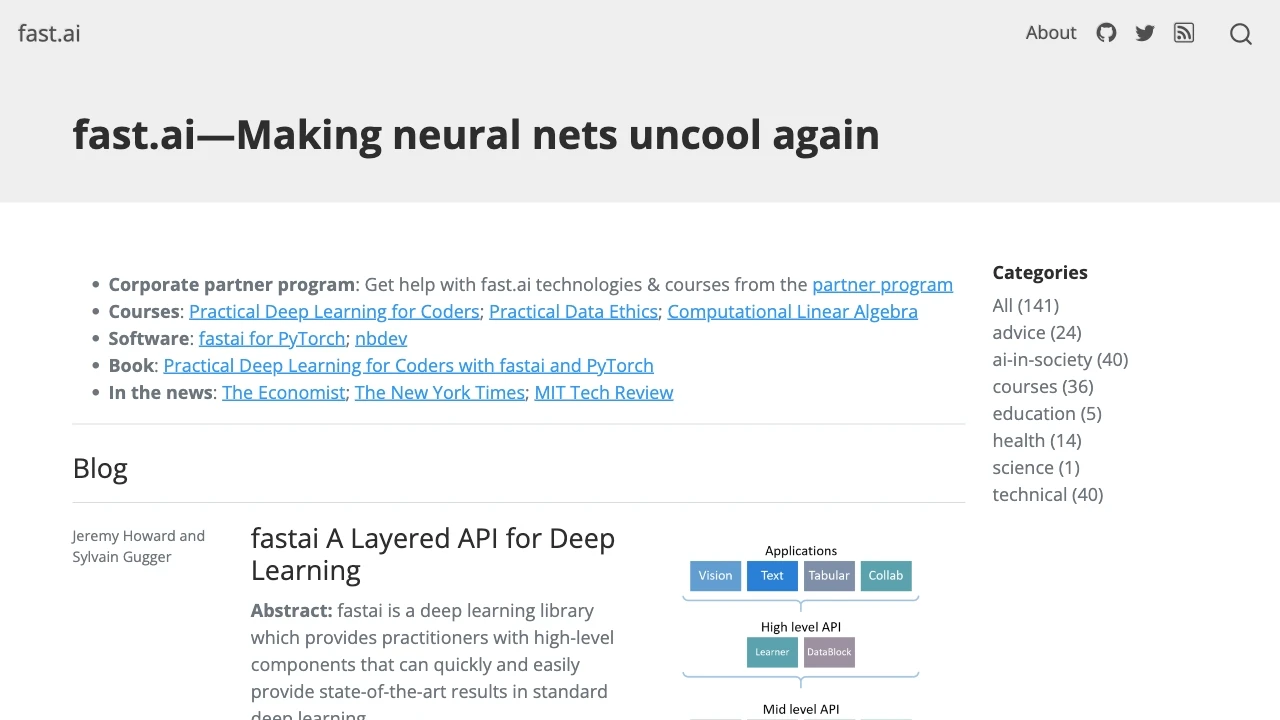DataCamp versus fast.ai
DataCamp, launched in 2013, offers interactive coding courses in data science and analytics, targeting beginners and professionals. Fast.ai, founded in 2016, focuses on deep learning, with a mission to make AI accessible to all. Both emphasize hands-on learning but cater to different audiences: DataCamp for broader data skills, and fast.ai for advanced machine learning.


DataCamp
Ideal For
Learning data science and AI fundamentals
practicing Python and R coding
improving statistics knowledge
developing data engineering skills
Key Strengths
Flexible learning at your own pace
extensive course selection
hands-on projects for real experience
Core Features
Interactive video tutorials
coding challenges
wide range of courses
practice datasets
real-world projects
fast.ai
Ideal For
Acquiring practical skills in AI and machine learning
Engaging with up-to-date discussions on AI ethics
Applying deep learning techniques in projects
Utilizing data science toolkits for development
Key Strengths
User-friendly courses for all skill levels
Rich resources and supportive community
Emphasis on practical, real-world applications
Core Features
Hands-on courses for practical deep learning
Comprehensive tutorials on AI and machine learning
Engaging blog with insights on AI ethics
Resource sharing for data scientists
Supportive community for learning exchange
Popularity
Decision Matrix
| Factor | DataCamp | fast.ai |
|---|---|---|
| Ease of Use |
|
|
| Features |
|
|
| Value for Money |
|
|
| Interface Design |
|
|
| Learning Curve |
|
|
| Customization Options |
|
|
Quick Decision Guide
- You want hands-on coding practice with real datasets.
- You aim to learn data science through interactive courses.
- You value guided projects to enhance your portfolio.
- You look for flexible learning paths at your own pace.
- You want a community to connect with fellow learners.
- You seek user-friendly deep learning tools.
- You value a strong community and collaborative learning.
- You aim for quick experimentation with models.
- You prefer a focus on practical applications and results.
- You look for comprehensive documentation and tutorials.
What Our Experts Say
DataCamp excels in structured, interactive courses for beginners in data science, offering a wide range of topics and hands-on coding exercises. It is particularly effective for learning specific programming languages and tools. Conversely, fast.ai focuses on practical, in-depth deep learning with a strong emphasis on real-world applications. It suits experienced learners seeking advanced techniques. Both face challenges in engagement and retention but thrive in their targeted learning approaches.
Jamie Davis
Software Analyst
At a Glance
DataCamp is an interactive learning platform focused on data science and analytics, offering hands-on coding in R, Python, and SQL. Pros include structured courses and instant feedback; cons are limited depth in some subjects. fast.ai is more advanced, emphasizing practical deep learning with free, in-depth resources. Pros include a strong community and cutting-edge content; cons are a steeper learning curve. For beginners, DataCamp is ideal; for experienced learners, fast.ai excels.
Pricing and Subscription Plans
DataCamp offers individual plans starting at $25/month for the Basic tier, $33/month for Plus, and $43/month for Premium, with annual subscriptions providing savings. Team plans begin at $300/year per user for Business. Fast.ai, in contrast, is primarily free, relying on donations for support. This makes Fast.ai exceptionally cost-effective for individuals and small businesses, whereas DataCamp provides structured learning paths suitable for larger organizations.
Performance Metrics
DataCamp offers interactive coding lessons with quick feedback, leading to faster learning but varying depth of understanding. Fast.ai, emphasizing practical applications, excels in accuracy and reliability, particularly in deep learning contexts. For quick skill acquisition, DataCamp shines, while Fast.ai is superior for in-depth comprehension and real-world applications.
User Experience
DataCamp offers a sleek, user-friendly interface with a structured learning path, making navigation intuitive. Customizability is limited, focusing on guided content. The learning curve is gentle, ideal for beginners, supplemented by robust user support via forums and tutorials. In contrast, fast.ai features a more modular design that allows for flexibility and deep dives into topics, but may pose a steeper learning curve with less structured navigation and varied support resources, primarily community-driven.
Integrations and Compatibility
DataCamp integrates with third-party apps like Slack, GitHub, and Tableau for seamless workflow integration. In contrast, fast.ai focuses on compatibility with Jupyter notebooks and popular libraries (e.g., PyTorch). DataCamp supports more business-oriented tools.
Limitations and Drawbacks
DataCamp's limitations include a lack of in-depth theoretical content and reliance on guided exercises. Fast.ai can be challenging for beginners due to its fast pace and advanced concepts. Workarounds include supplementing DataCamp with textbooks and using Fast.ai forums for support.